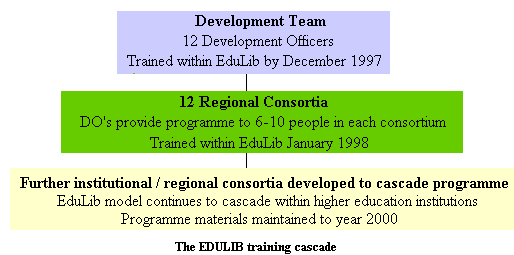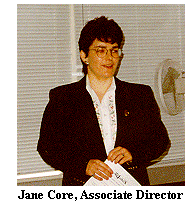EduLib: The National Network of Electronic Library Accredited Trainers
User education, information skills, librarians as educators? - the literature is more plentiful than rich. Paradoxically, references to the application of educational theory, concerning the way people learn, and how this is reflected in the activities and skills of librarians, are most infrequent. Librarians are involved now in training and supporting the users of information, and have every reason to be optimistic about the value and need for this in future. Changing terminology, trying to redefine the image conjured up by user education, has often served to do little more than perpetuate the cliché that librarians really want to be teachers! The majority of librarians like being librarians but appreciate that they have an evolving educational role. EduLib aims to make a more lasting change happen in libraries by recognising and providing staff development opportunities for the unique and complementary role librarians have to play in higher education.
Why should EduLib succeed now?
Demand from librarians already evolving their education and training role is fueled by the widespread availability of networked information services e.g. under the auspices of JISC. The exploitation of such information services has occurred alongside educational initiatives designed to harness technology in the service of learning, teaching and research e.g. CTI’s and TLTP (within which TILT has been the first to address generic courseware for “electronic library” skills ). The Follett Review Group, and as a result the Electronic Libraries Programme has positioned libraries to respond strategically to such educational and technological innovation. As these initiatives have developed librarians have been identified as key agents in the provision of training in the use of networked information, and as such now have an opportunity to contribute to the cultural change taking place in higher education. The developments above issue an exciting challenge and prospect for librarians.
Are we any better prepared to meet the challenge than we were when “user education”  began 20 years ago? EduLib and other eLib training and awareness projects mean that we are. As the focus shifts from classroom centred teaching towards enabling active learning, librarians are empowered to contribute. Any change or innovation must prepare to address strategic and cultural issues and these have been well documented elsewhere in respect of an educational role for librarians.[1] The major issue for many individual librarians is whether they feel skilled to deliver “electronic library” training and support.
began 20 years ago? EduLib and other eLib training and awareness projects mean that we are. As the focus shifts from classroom centred teaching towards enabling active learning, librarians are empowered to contribute. Any change or innovation must prepare to address strategic and cultural issues and these have been well documented elsewhere in respect of an educational role for librarians.[1] The major issue for many individual librarians is whether they feel skilled to deliver “electronic library” training and support.
EduLib aims to provide librarians with the opportunity to acquire, or further develop their existing educational skills in order to ensure the design and delivery of effective training programmes. This will be achieved by developing a nationally recognised and accredited network of library trainers. EduLib trainers will possess both the networked information skills, and the pedagogic skills required to make the use of electronic libraries an everyday part of learning, teaching and research.
Shaping the EduLib model
EduLib involves a cross disciplinary team of practicing librarians, academic colleagues and educationists. EduLib will build on existing practice and will benefit also from the combined experience of the following:
- The initial Development Team of 12 practicing librarians who have been selected to represent the current diversity of higher education. The development team will be the first accredited trainees of the project. They will shape and guide the programme, assuring relevance to librarians supporting users of the networked information sources which underpin the notion of the electronic library.
- The Centre for Teaching Learning and Support at the University of Hull which has established a successful collegiate staff development model.
- The University of Abertay Dundee Library which has integrated LISP (the Library Information Skills Programme ), with students’ subject based modules, giving an excellent focus on the needs of students and the skills needs of library staff.
- SEDA, the providers of teacher accreditation for higher education in the UK, and the principal organisation in the UK for the encouragement of innovation and good practice in teaching and learning in higher education. At the end of the funded period EduLib will comprise, the training programme itself and equally importantly, the network of institutions and librarians that have participated. Once the first Development Team of 12 Development Officers are trained they will recruit and train subsequent teams (of a further 6-10 people) within regional consortia - thus perpetuating the model as a collegiate, rather than a top down approach to staff development.
What sort of content and materials will EduLib use or produce?
In keeping with the spirit of eLib the EduLib programme will use networked communication, dissemination and collaboration wherever it is appropriate. The final programme materials will be available in appropriate networked formats, e.g. WWW.
EduLib clearly involves two areas of training that are at times difficult to separate. Firstly there is the educational (EduLib) programme itself, the actual content of the programme will depend upon the outcome of the needs analysis but is likely to equip trainees with the capacity to:
- select and evaluate methods relevant to network training,
- organise and develop learning events involving active use of networked information, and the use of the network as a method of delivering the learning experience,
- develop diagnostic skills focused to ensure that learners receive appropriate support and advice,
- develop knowledge and practical experience in methods of obtaining feedback from client groups about their satisfaction, and about the effectiveness as trainers, of those providing the learning events.
 Secondly, there are the programmes developed by trainees as part of their EduLib portfolio. The content and delivery of trainees own training programmes, upon which they are assessed, will involve developing original materials in addition to the evaluation and integration existing materials. Here EduLib will cooperate with other projects in the training and awareness area - principally Netskills. Netskills will be developing high quality learning packages to address specific network skills. It is envisaged that Netskills materials will be relevant to the content of the EduLib trainees’ own programmes, in addition to which Netskills materials may be used by EduLib trainees to enhance their own network competence. Equally, the product development team at Netskills will benefit from the evaluations and piloting of materials EduLib can offer, and EduLib will collaborate with the Netskills team to offer appropriate pedagogic underpinning for product development.
Secondly, there are the programmes developed by trainees as part of their EduLib portfolio. The content and delivery of trainees own training programmes, upon which they are assessed, will involve developing original materials in addition to the evaluation and integration existing materials. Here EduLib will cooperate with other projects in the training and awareness area - principally Netskills. Netskills will be developing high quality learning packages to address specific network skills. It is envisaged that Netskills materials will be relevant to the content of the EduLib trainees’ own programmes, in addition to which Netskills materials may be used by EduLib trainees to enhance their own network competence. Equally, the product development team at Netskills will benefit from the evaluations and piloting of materials EduLib can offer, and EduLib will collaborate with the Netskills team to offer appropriate pedagogic underpinning for product development.
What direct benefits will EduLib offer librarians in the HE community?
- The development of a professional culture allowing librarians to take responsibility for their own training.
- Ongoing opportunities for librarians to become involved in regional consortia supported by their institutions, with the additional opportunity of a nationally recognised accredited programme.
- The programme materials themselves - it is intended that these will be maintained for three years beyond the lifetime of the funded project to allow the training cascade to continue.
- The training programmes developed by librarians during and beyond their training period - these may have been used with students and / or with colleagues, they will be a tangible resource that may be maintained by and for the institution - enhancing awareness and effective use of network potential in teaching and learning.
Getting involved with EduLib
EduLib will keep the higher education library community informed of progress in the training of the first development team and will recruit trainees to subsequent development teams as the project develops. It will be possible to get involved with EduLib actively, passively or virtually! Librarians are encouraged to:
- make colleagues aware of EduLib and consider it’s potential as a model for institutional staff development.
- participate in the programme directly as a member of a regional consortium or remaining aware of regional consortia - a Development Officer has been assigned to every HE institution in the UK to act as regional liaison.
- join and contribute to the mailbase list lis-elib-edulib which acts as a forum for the discussion of issues surrounding the teaching and learning role of librarians working with networked information.
- attend awareness events held around the country, these may be regional or institutional depending on demand and will involve cooperation with Netskills wherever possible.
- visit EduLib WWW. which has been created, to inform the community further, to create links to the Core Team and the Development Team and to disseminate the programme outline and materials.
References
- Noon, Patrick (1994) Finding a stragetic role for information skills in academic libraries in Information Skills in Academic Libraries SEDA Paper: 82. Staff Education and Devlopment Association.
